As a western feminist interested in women’s rights in the Middle East, I stand in awe of the brave, strong women standing up as a fresh voice of a generation that will not accept sexist inequality and oppression anymore. One of those contemporary voices is the Egyptian-American journalist and activist Mona Eltahawy, who published the book Headscarves and Hymens: Why the Middle East Needs a Sexual Revolution in May.
Although I think these are the kind of books that need to be published today, I agree with an often articulated critique of Eltahawy’s point of view: not all men are our enemy. Feminism is not a war against men; it’s too often about fighting an idea that resides in the minds of women themselves as well.
What I noticed while reading Eltahawy’s book is the emotional factor that greatly influences her perspective. Instead of writing from a point of view that stems from rationality in pursuit of a solution, she seems driven by a lot of anger and pain, which is understandable. I am not saying it is impossible for women to be emotional and rational at the same time, or trying to devalue Eltahawy’s experiences. Her story is hers to own and she does that with tremendous bravery, seeing the strength almost lighting up the pages of her feminist manifest.
What I am saying is that sometimes, an outsider’s perspective could bring more objectivity to the table seeing that their views aren’t clouded by traumatic events which may lead to dangerous generalizations.
In the first pages of her book Headscarves & Hymens, Eltahawy clearly says that she was traumatized to be a feminist. As a Western, white female, I was not. Given that, I’d like to add something to this crucial debate.
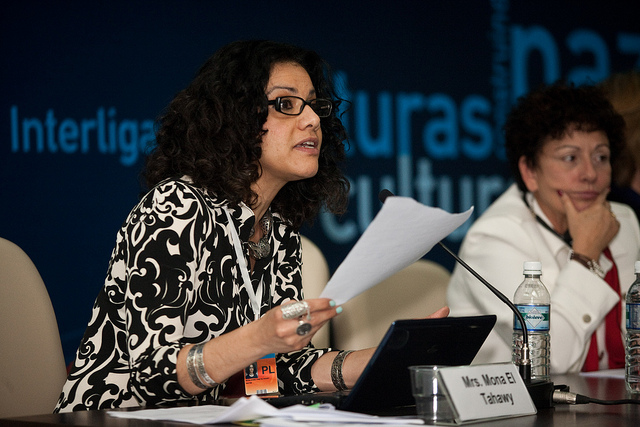
Toxic Mix
According to Eltahawy, the women-oppressing mentality of Muslim men in the Middle East is the result of a ‘dangerous toxic mix of religion and culture’. This is probably where she loses many readers who find their roots in Islamic cultures, and what makes people serve her off as ‘radical’.
Eltahawy and her anger don’t seem to give enough regards to the fact that most people in the Middle East aren’t ready to choose a girl’s safety over their religious and moral ideas. However, I applaud Eltahawy’s ruthless approach to stir up the established mentality. Critical voices are functional in transforming a society.
From my personal stance, the most radical aspect of her approach is her use of generalizations. Her sweeping statement of putting both genders into firmly standing roles – the enemy and the victim – has no function at all in fighting the manifested gender roles.
For example, Eltahawy shares her experiences with gender-segregation as a teenager in Saudi-Arabia. I don’t see how thinking in ‘us’ – Arab women – versus ‘them’, Arab men, terms is anything less than a form of segregation, when she asked herself the infamous question: ‘Why do they hate us?’ If men and women are to be equal, in the public’s eye, as well as the state and within the domestic life, we must treat them equally: don’t turn all women into victims and don’t treat all men as offenders. It’s a patriarchal system that needs to be fought collectively, not a war of women against men.
If one agrees with Eltahawy’s notion that this women-hating patriarchy finds its roots in the aforementioned combination of religion and culture, then changing such culture cannot happen without changing the men who were raised in it. We cannot expect to transform the side to which history has been biased to with only one half of the population. She writes the following about Arab men:
“They hate us because they need us, they fear us, they understand how much control it takes to keep us in line, to keep us good girls with our hymens intact until it’s time for them to f**k us into mothers who raise future generations of misogynists to forever fuel their patriarchy. They hate us because we are at once their temptation and their salvation from that patriarchy, which they must sooner or later realize, hurts them, too.”
It’s the ‘they’ that is problematic. Serving off all Arab men as oppressing, woman-hating and violently hostiles makes the struggle for gender equality even harder. Men are a part of the problem, and therefore men are a part of the solution.
We shouldn’t see them as the living form of the problem itself: the problem is the idea that women are inferior to men. Men are the key to a society where women are not inferior to – let alone murdered, physically and mentally abused and oppressed by – their male co-citizens.
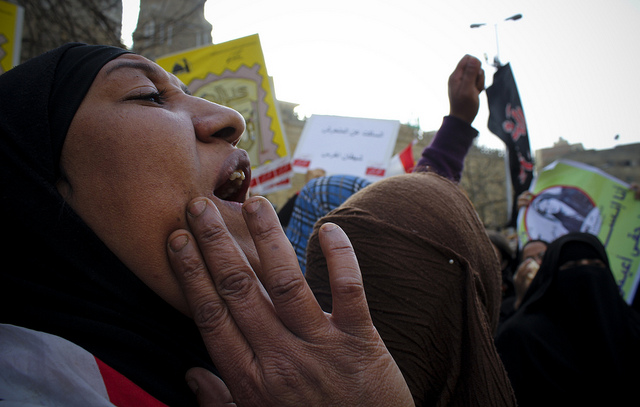
The Egyptian case
The cultural and practicing-religious diversity in the Middle East is immense and therefore I’d like to focus on the Egyptian case. I am not saying patriarchy is solely a Middle Eastern or Egyptian problem; the idea of inferiority of women is transnational and manifests itself in many cultural forms. For those who are still in denial of the women-hating patriarchy that rules Egypt, I recommend reading Eltahawy’s book. If this book shows one thing, it’s how much a sexual revolution is needed. It does so not only by telling women’s personal experiences, but it’s also done through quoting surveys and contextualizing the data.
One of the examples that Eltahawy uses to illustrate her point – men hating women – is female genital mutilation. FGM is a direct attack on human rights and shows the specific way in which Egypt expresses its fear of female sexuality – this fear being a transnational feature of patriarchy. Ninety-two per cent of once married women aged between 15 and 49 in Egypt have had their genitals mutilated. Only 31 per cent of those operations have been performed by an actual doctor, according to the Minister of Health.
Just like I do, Eltahawy asks herself how women can let this happen to their daughters. I remember reading stories of women whose mothers and grandmothers held them down when they were still children, and how someone –most likely not a doctor– cut off a part of their clitoris and/or labia, sometimes with a scissor, and often without any form of anesthesia. Those stories haunted me, not just because of the brutality in the act, but because cutting off the most sensitive part of a woman’s body, while most likely still being a child who is wide awake and screaming, is a threat to women’s rights worldwide.
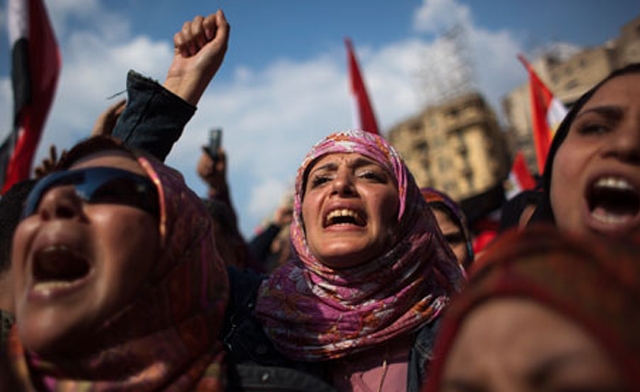
Victimizing Arab Women Is Not The Answer
While we ask the same moral, angry question, I strongly disagree with Eltahawy’s nuance in her answer: “In order to survive, women police their daughters’ bodies and their own, subsuming desire for the ‘honor’ and the family’s good name.”
She turns all the mothers who mutilated their daughters into victims of the patriarchy that they grew up in, victims of their own survival mechanism. Those mothers genuinely believe that the decision to mutilate their daughters’ bodies is the best one for their child by restraining her sexuality.
So then, when a father makes this decision, how does being a victim suddenly change into an act of women-hating in itself? Are they not just as much a victim, an outcome, of a cultural and religious misogynist environment?
Everybody is a victim of the system, and at the same time, neither men nor women ought to be victimized because they are themselves what is keeping the system alive.
It doesn’t matter whether they are men or women, both are as guilty of being led by a misogynist mentality. Both stand motionless as they watch their screaming daughters’ plea to be saved, but they choose not to take action because they value culture and religion over her physical and mental wellbeing. A girl can better be dead than a shame to the family’s honor.
Just like religion and culture, a self-protecting survival mechanism should not ever pardon a violation of human rights. A sexual revolution does not start by victimizing women. Eltahawy’s ‘they’ in the question ‘why they hate us’ does not refer to Arab men. It refers to all people oppressing women, and too often, those people are females themselves.
That is why a sexual revolution in Egypt, and other Arab countries, should not be a war against Arab men. It should be a war against the idea that women are inferior to men. It should be a war against that exact toxic mix of culture, tradition and religion that Eltahawy speaks about. Angry declarations of ‘us’ against ‘them’ is not going to make a sexual revolution happen. If anything, it will only light up that toxic mix. It will highlight the segregation, and it is segregation that makes it possible to value one group over the other because of gender.
So here I am, standing in awe at the many brave feminists of the new generation in Egypt and across the Middle East, who happen not to be all women. There are brave young men among them, willing to fight what they’ve been taught all their lives with morality; willing to fight their fathers, their uncles and their brothers, to protect their sisters.
When both men and women can collectivize the courage that is needed to do so – not just for protecting their mothers, themselves and their daughters, but because it is the right thing to do – that is where equality of the sexes is born.



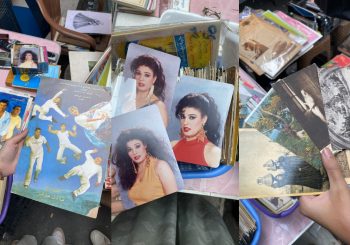
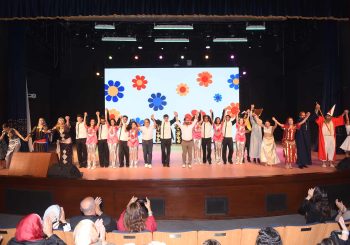

Comments (19)
What kind of article was this? This is AWFUL journalism. Taken from a white woman’s perspective. No thanks I don’t want to hear your opinion on our region or on our culture. something you will NEVER understand with your white feminist privilege. This is the ‘not all men’ argument. Any decent man knows that when we talk about these problems and blame men we do not mean all men, but we do mean the majority who do in fact think / act in varying degrees in a nature that is sexist and harmful to women.
Thanks for writing this article to defend men. Yes now you will be accepted by them as a rational woman. I APPLAUD YOU.
This is honestly a disgusting article. And how DARE you undermine Tahawy’s opinion because you say it is emotionally driven. she was sexually assaulted by the forces that are supposed to protect us. This article is pure trash. I can’t believe EgyptianStreets would even publish this. The credibility is at a zero here.
Focus on your country, or on the western world. We neither want nor need your first world privileged ‘advice’. Your opinion is invalid and plain WRONG.
This is how you can earn 65 bucks hour… After searching for a job that suits me for 6 months , I started working over this internet-website and today& I possibly can not be more happy. After 3 months on my new job my income is around 5000 dollars/monthly -Visit link on MY~PAGE to see more
Follow path of~ thousands who are earning cash each month by freelancing online… Get informed more on my page———>disqus page
I agree 100%. The author of this article needs to know she should not speak on issues she is clearly uninformed about. How can she say women and men are equal victims of the system?!?! This article is pure bullshit.
That is the biggest problem causing the major unrest for the raghead Muslims, who have a great time treating women like slaves till today, and they are shi’tting bricks thinking about the new information revolution, and women rights that their women are being exposed to. I was in a hotel in Washingtom a few years ago, when a Saudi woman at the bar started a conversation with me and learned that I speak Arabic. She explained that her husband has a high position in the Saudi embassy, and that he beats her and abuse her, and she wishes to run away. Of course, I told that I was married, and that there are shelters for battered women that can house her. She said, that her husband will claim diplomatic rights to take her back even to kill her. Honor killing is common among the Stone Age Wahhabi desert dwellers.
The abusive Muslim men age of women abuse is running out, and terrorizing the West to keep doing your Neanderthal abuse, is only going to increase their determination to exterminate the extremist Islamists.
It was hard to get through this article mostly because of how much I disagree with you, so if I get some things wrong bear with me. Being an intersectional feminist myself who is neither white nor western, I know the struggles that Eltahawy speaks of very well. But privilege is not the issue.
It seems to me that you would be a person to believe in something like the “color blind” ideology when it comes to racism for example; because you are applying that same principle when it comes to feminism. The idea of not completely and 100% professing that women are victims. I know that you want to be very politically correct and try not to differentiate between men and women like the example of genital mutilation, but what you and many others don’t understand is that the nature of these issues is NOT political correctness; and we therefore cannot address them in that manner. When a woman (for the most part) practices female genital mutilation on her daughter, she IS a victim and it IS different between a woman and a man. Because what you don’t understand, from your position of privilege, is the inner complex in Egyptian men (whom you refer to as victims of the system) that only a native such as Eltahawy can understand and attempt to describe. It is real, and it is happening. Unfortunately since we are not all blessed with researchers who would devote time onto exploring it in this country; I can’t offer you any science to back it up, but it IS real. There is truly something there, a deep and dangerous misogyny and I can see how now (since we know nothing else) refer to it as a consequence of the system, but like I said it isn’t. It is a deep rooted anger (that I suppose is a result of the system, but everything is if you think about it) that is very specific and is worthy of its own name. It just didn’t get a chance to be uncovered and properly defined because of how in Egypt and other third world countries that are not privileged such as others, don’t have the resources to devote to something like this.
Thank you for leaving your reaction and taking the time to explain to me your perspective, even though you strongly disagree with me.
I would like you to know that I continue to educate myself on intersectional feminism and thereby continuously try to be aware of placing my individual Western female perspective on perspectives I cannot fully understand simply because I am chained to my framework. However, that doesn’t mean I cannot apply those principles on other societies. Being aware that certain principles of equality and human rights are not universal doesn’t mean I cannot say I want them to be universal.
Let me be very clear that I don’t refer to men as victims in this situation; what I am saying is that the causes and effects of the system are much more complicated than the ‘offender’ and the ‘victim’. We should look beyond those actors and see what is really going on by politically incorrectly discuss the influence of religion and culture on what is happening in the minds of both men and women.
I believe the deep rooted anger you are speaking about is real. I do. But what this article is about is that exactly that anger is what’s making it so hard to reform social structures. It terrifies both men and women. While that anger can be of great function to unchain a revolution, what is the endgoal of it? The extension of Eltahawy’s quote I used is this: “They hate us because they know that once we rid ourselves of the alliance of State and Street that works in tandem to control us, we will demand a reckoning.” I believe this is true, but I am asking you: what is this reckoning? Should there be a reckoning?